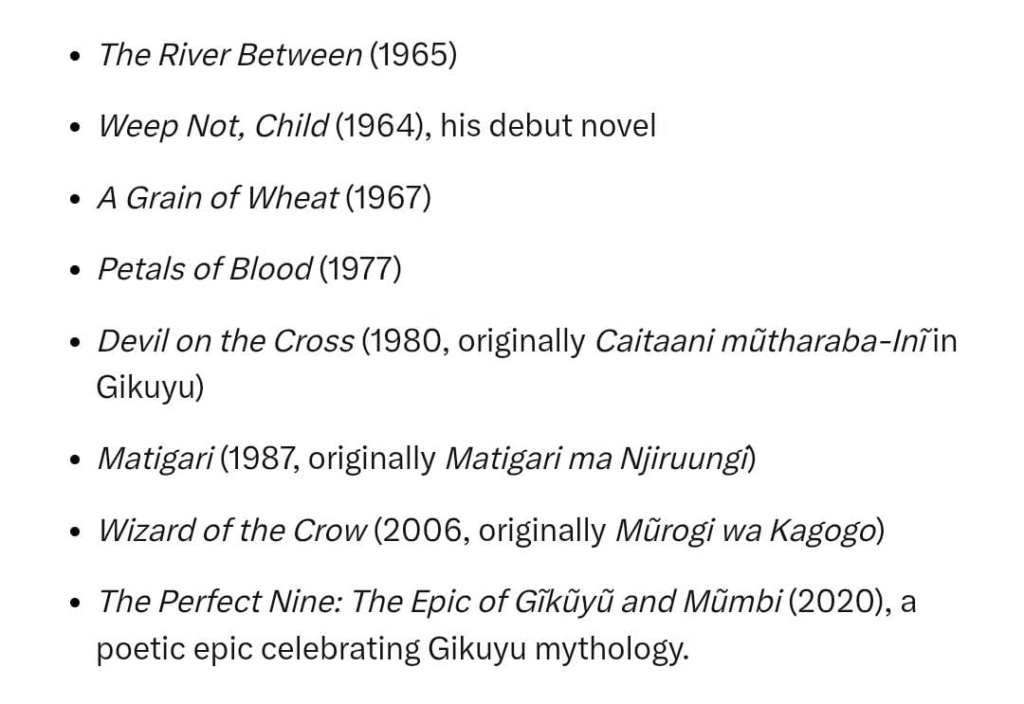In celebration of African literature, we’re spotlighting the prolific career of Kenyan literary giant Ngũgĩ wa Thiong’o, whose works have shaped global conversations on colonialism, language, and cultural identity. Known for his powerful storytelling and commitment to writing in his native Gikuyu, Ngũgĩ’s extensive bibliography spans novels, plays, essays, memoirs, and children’s books. Here’s a rundown of his major works, perfect for readers and scholars eager to explore his contributions.
Novels That Redefined African Storytelling
Ngũgĩ’s novels tackle themes of resistance, identity, and post-colonial struggles. His notable works include:
The River Between (1965) Weep Not, Child (1964), his debut novel A Grain of Wheat (1967) Petals of Blood (1977) Devil on the Cross (1980, originally Caitaani mũtharaba-Inĩ in Gikuyu) Matigari (1987, originally Matigari ma Njiruungi) Wizard of the Crow (2006, originally Mũrogi wa Kagogo) The Perfect Nine: The Epic of Gĩkũyũ and Mũmbi (2020), a poetic epic celebrating Gikuyu mythology.
Plays That Challenged the Status Quo
Ngũgĩ’s dramatic works, often co-authored, blend political activism with cultural narratives:
The Black Hermit (1963) This Time Tomorrow (1970) The Trial of Dedan Kimathi (1976, with Micere Githae Mugo) I Will Marry When I Want (1977, originally Ngaahika Ndeenda, with Ngugi wa Mirii).

Short Stories and Children’s Books
Ngũgĩ’s Secret Lives and Other Stories (1975) offers poignant tales of Kenyan life. For younger readers, he penned:
Njamba Nene and the Flying Bus (1986)
Njamba Nene’s Pistol (1986)
Njamba Nene and the Cruel Chief (1988).
Memoirs and Essays: A Voice for Decolonization
Ngũgĩ’s non-fiction reflects his advocacy for African languages and cultural liberation. Key titles include:
Detained: A Writer’s Prison Diary (1981) Decolonising the Mind (1986), a seminal work on linguistic liberation Dreams in a Time of War (2010), a childhood memoir In the House of the Interpreter (2012) Birth of a Dream Weaver (2016) Essays like Homecoming (1972), Moving the Centre (1993), and Globalectics (2012) explore African literature and politics.
Why Ngũgĩ Matters Today
Ngũgĩ’s decision to write in Gikuyu, starting with Devil on the Cross, challenged the dominance of colonial languages in African literature. His works, translated into English and beyond, continue to inspire writers and activists worldwide. From his early novels under the name James Ngugi to his recent epic The Perfect Nine, Ngũgĩ remains a towering figure in global literature.
For readers looking to dive into Ngũgĩ’s world, start with A Grain of Wheat for its historical depth or Decolonising the Mind for its revolutionary ideas.







